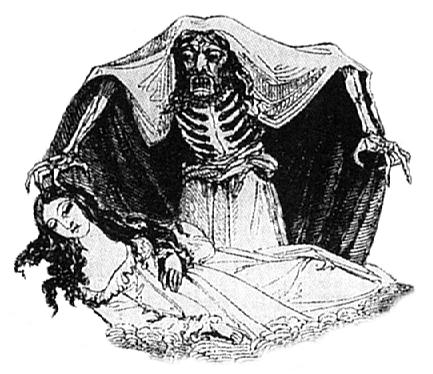Some ideas on modelling "draining" attacks in old school games:
Attribute Drain
The drain targets and changes an attribute. Bloodsucking usually decreases physical characteristics, energy drain or psychic vampirism affects mental characteristics, but it's always interesting to have unusual leeching, e.g. if your system has a Luck attribute, why not drain it?There are a couple of different ways to do it mechanically:
- Decrease the attribute by a numeric value (1, or roll a dice). Recalculate modifier and any related secondary attributes.
- Bump the attribute down to the next modifier level. E.g. if the character's Strength attribute gives them a +2, lower it to the closest value that would give only +1. Then 0, -1, -2, -3. -3 is bumped down to death. (I think I took this from the LotFP Referee Book)
- Re-roll the drained attribute using the standard character generation method (e.g. 3d6). Take the lower result. Recalculate modifier and any related secondary attributes.
- If your system doesn't have a designated Luck attribute, but you want to model the draining of a character's "luckiness", how about applying a negative modifier to attack roles or Saves?
Advanced Psychic Vampirism
A psychic drain can either target an attribute (see above), or change some other "mental" thing.- Draining the spellcasters:
- An ability that gives the caster spell usage is affected, e.g an unused spell slot becomes expended or spell points are drained.
- A memorized or prepared spell is erased from the mind of the victim for the day. A more severe version is removing the ability to prepare a spell at all (the spell might be re-learnt with effort).
- Draining the Clerics:
- Mwhahahaha...
- Remove the ability to Turn Undead for a set amount of time (based on the HD of the draining creature).
- Disable or reverse certain Clerical spells for a set amount of time (based on the HD of the draining creature). Forcing reversal is an interesting choice: fluff-wise, for example it makes a "good Cleric" a vampiric agent: cannot cast Cure Wounds, can only inflict pain, healing spells become curses and so forth.
- Non mechanic-based draining:
- Drain memories: the character forgets something. The higher the HD of the draining creature, the more important is the memory. It can be a personal memory, or a piece of knowledge, depending on the flavor of vampirism.
- Drain "capability": the character forgets a learned/trained/nurtured skill, like fancy fencing moves, riding a bicycle, swimming, arithmetic, etc.
Level Drain
A classic! Feared by everybody. Perhaps too severe to some DM's tastes. You can try draining experience points instead (e.g. creature HD x 1d10 x 100 ?), or model the loss of "experience" by draining memories and skills, as above.
Parasitism
The effect isn't constrained to a one-time drain. The creature latches on to the victim, forms a bond or channel between them (this can be physical, but also psychic, sympathetic, magical). Through this channel, the creature can constantly feed on the victim even when they are not present. This connection stays until severed by magical means or until the initiating creature is destroyed.
Some possible effects:
- The victim cannot naturally heal.
- Once in a given period (week, month, during every full moon) the victim suffers the effect of the drain, e.g. loses hit points, loses an attribute point, or suffers memory loss.
- The victim is drawn to the creature (classic vampirism!)
The parasitic connection can have a visible / detectable sign on the victim (change in skin or eye color, clothing preferences, sunlight sensitivity, mental disturbance, sickness, etc.).
Withering & Weakening
Draining hit points ( = doing damage) is okay, but perhaps kinda boring? Weakening attacks can target Constitution too. I personally like using the HD attribute in various ways. For example:
The drained character must immediately re-roll all their hit dice. Constitution modifier applies only if it's negative. Take the new value if it's lower than the previous maximum hit points. Current hit points drop down to equal the new maximum or remain unchanged if already lower.
Aging
The victim rapidly ages. Roll a number of d10's equal to the HD of the draining creature. The total is how many years the victim ages. For each full 10 years, the victim loses 1 point of Dexterity. For each full 20 years, the victim also loses 1 point of Constitution.
Benevolent Leech
The bloodsucking creature drains 1d6 hit points worth of blood. If the victim is diseased, poisoned or has a similar ailment, they may roll a Save against Poison with a bonus equal to the amount of hitpoints drained; on a success, the victim is cured of the condition.
Alternatively, a psychic vampire takes away insanity, nightmares, etc.


This is such a creative post. I love these variants; they provide options to level drain without feeling "soft". I linked to this post on my blog and mentioned it on my podcast this week. Great job!
ReplyDeleteYou've eaten my thoughts!!
DeleteCheers, thanks for including me! I'm glad you liked it.
I was just working on altering BX energy drain for my game, and nerfing the more powerful undead a bit, also looking at https://wizzzargh.blogspot.com/2018/07/a-quick-digression-about-d-undead.html
ReplyDeleteMy current though is to have Wights first need to grapple, then inhale the victim's soul/life force, reducing their CHA by 1d4, which also increases the Wight's HP (not capped to a maximum) by the same amount. If the Wight is slain, this life force is returned to any affected victims, restoring lost CHA. Of course, 0 CHA = death, later rising as a new Wight.
Good post!
DeleteI love your take on skeletons :D "Skeletons use their ribcages to store giant poison vermin" this is awesome, I'll definitely use this!
Not my post, but I agree!
DeleteAh right, I skipped a word in your comment :) Thanks for the link in that case!
Delete